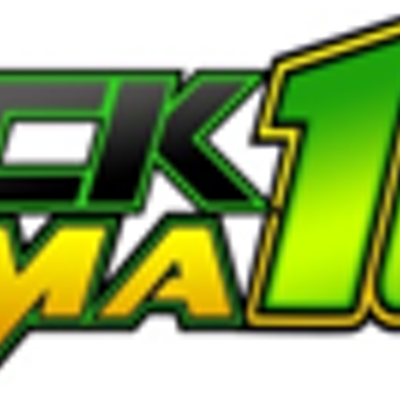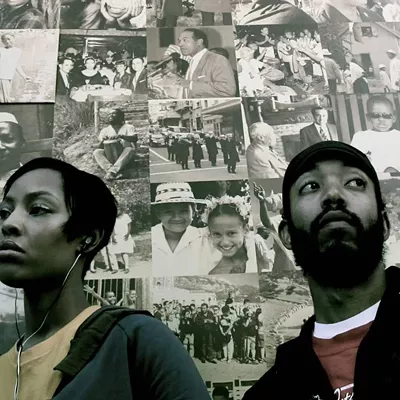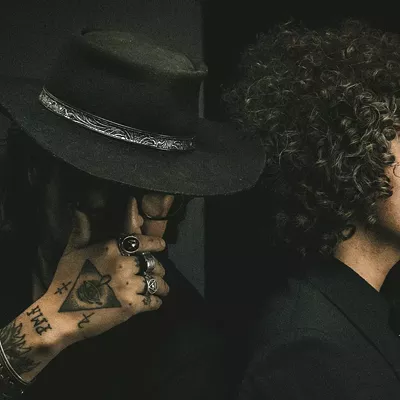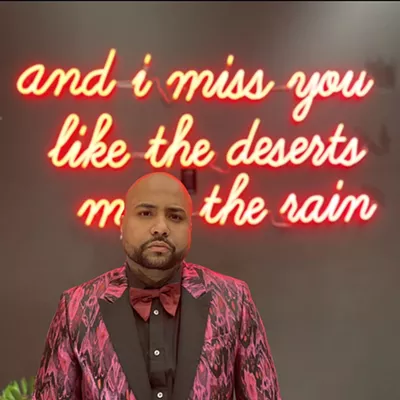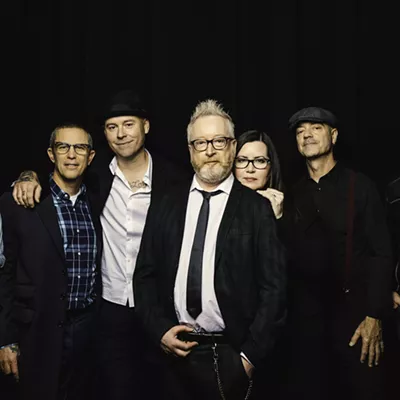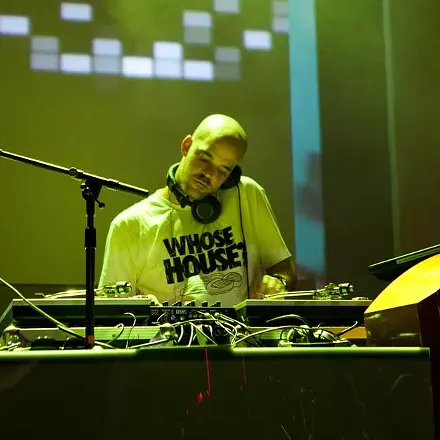Iglesias, the hunk of a Latin pop singer, had his prominently placed mole removed in 2003, apparently at his doctor's suggestion. Crawford, on the other hand, has never felt the need. You can call it a beauty mark if you must, but it is a mole. (Or, as Billy Joel once memorably sang, "Everybody's talkin' 'bout a beauty mark, baby, but it's still just a mole to me.") Does Cindy's mole make her any less attractive? Of course not. In fact, one could argue that such an imperfection only enhances her beauty, makes it a little more mysterious. In this equation, Golden Boots are the Cindy Crawford of ... well, whatever kind of music it is that they play.
The Tucson band--singers-songwriters-guitarists Dimitri Manos and Ryen Eggleston, bassist and recording engineer Nathan Sabatino and drummer James Grip--is more concerned about capturing a unique moment of inspiration than it is getting things superficially perfect (see Iglesias' mole-less face). And that's why, despite the fact that Sabatino owns and operates Loveland Studio, a local recording studio where he's recorded dozens of musicians, the band prefers to record on whatever 8-track or 4-track tape machine happens to be around. It's all about the immediacy, and, well, if there are blemishes in that inspired first take, that's just fine (see Crawford's gorgeous mole-dotted visage).
"I'm personally not a big fan of studios," explains Manos, "because I feel like it puts a time constraint on when you're creative. So, your sounds might need to be cleaned up afterwards, but if you're feeling it in that moment, and the 4-track or 8-track and the microphones are sitting right there, it might be two in the morning, and you might call in sick to work to do this tune, but then you're feeling it, and then is the best time to do this thing. Blocking time works for different people, for sure, but the shit I like is always the stuff that's done immediate, including the mistakes and all of it.
"The creative process is what I'm interested in. It's mathematics to write a pop song, but human error is the beauty of music as far as I'm concerned."
Adds Eggleston: "That's our philosophical pillar right there."
Golden Boots began, in 2001, as the core duo of Eggleston and Manos, who regularly recorded songs together, but rarely performed live, an arrangement that lasted a few years. At the same time, the pair had been in two bands, Galactic Federation of Love and Sugarbush, which both broke up following a grueling 10-week joint tour, in 2004. Galactic Feds were scheduled to open a CD-release show for another local band, The Beta Sweat, but broke up prior to the gig. In order to keep their commitment, Eggleston and Manos hastily put together a live incarnation of Golden Boots for the show, and proceeded to write and record an album, Bland Canyon, in two days, so they'd have something to sell at the merch table. Though the lineup has shifted a bit since then, the current one has been the most solid and enduring, even if the band still somewhat operates on a whoever's-around looseness where recording is concerned. (One never knows who will be present when inspiration strikes, after all.)
"As soon as James and Nathan came in," says Manos, "this idea of a band formed instead of this kind of joke. Up until that point, I had this dismissive idea of like, 'This is a novelty. This is guys that don't know how to play, pretending to be in a band.' But we got enough people behind it and it was like, 'OK, there's four guys, so maybe the joke's on us. We are a band,' or something like that."
They are, indeed, a band, and one that's not doing too badly for itself these days. This week Golden Boots will release a new album, The Winter of Our Discotheque, on Park the Van Records, a Philadelphia-based indie with a relatively small but impressive roster of bands that includes Dr. Dog, The Spinto Band, and The High Strung. The vinyl version of the album will be released on Tucson's Mudhouse Records--an arrangement made possible by a clause in the band's contract with Park the Van that allows it to release material on other labels, crucial for a band as prolific as the Boots. By Manos' estimation, including live and (often very) limited-edition releases, Winter is the band's 14th album.
If Golden Boots' music was difficult to classify before--they call themselves "alt-alt-country"--such a pursuit is made far more difficult with the release of The Winter of Our Discotheque. The band has always traded in a sort of warped take on Americana, simultaneously organic and psychedelic. But this time around it would appear that the mixing of the record became at least as important as the basic recording process. Added to the basic recipe of skewed, twangy folk-rock is a plethora of interesting new sounds and genre dabbling. A synth here, some dubby, delay-treated drums there. A touch of reggae here, a noise freakout yonder. And those are just a few of the elements that are identifiable. There are many that are not--which, the band says, is by design.
Who knows, for example, what the hell is producing that sproingy sound that runs throughout "Heatwave," Winter's stunning, dance-friendly opening track, which has more in common with Animal Collective than with anything you'll find filed under "Americana." It's a dense electronic mishmash of sound that leads directly into "Easy Lie," a sparely arranged tune that employs sharp, terse guitar jabs and those aforementioned dub-inspired drums on the verses, before opening up into a gorgeous harmony-aided melody on the chorus. Elsewhere, "Black and Blue" is the most straightforward song here, simultaneously inspired vaguely by '60s British Invasion and Bakersfield country, with some well placed pedal or lap steel flourishes; first single "Love Is in the Air" has a country-ish vibe even as it merges tasteful reggae with vintage synth sounds and more of those harmonies; and "Makebelieve" is a relatively lo-fi, lovely and forlorn ballad that recounts a series of unfortunate incidents before concluding, "What a bad day it's been / I wish it was make-believe."
There's a lot crammed into The Winter of Our Discotheque's 10 songs, which clock in at around the 35-minute mark. (An EP of tracks that didn't end up on the album, Outtake Me to the Discotheque, is planned for a summer digital-only release.) It's one of those albums that reveals new sounds tucked within it each time it is heard--in music-geek parlance, it is a headphone album. And though it's easily the best-produced album Golden Boots has released to date, there are still some of those audible mistakes, too--proverbial moles that make it even better than glossy perfection. Like Cindy Crawford, Golden Boots wouldn't have it any other way.


